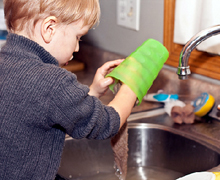By John Rosemond | A major U.S. newspaper recently ran a piece detailing all the ways children benefit from doing chores. Well, not all the ways. They failed to mention the most important benefit: Chores, properly managed, teach citizenship values.
“Properly managed” means children are not compensated monetarily for doing chores. Another parenting pundit once disagreed with me on that issue, pointing out that adults are paid for the work they do. That’s true, but apples are not watermelons.
First, working adults are trading labor for certain standards of living. Those adults then provide children with their standards of living. The money earned by adults is not an entitlement. The support those adults provide children is an entitlement. The two situations cannot be logically equated. From this perspective, chores are a child’s means of acknowledging that he is on an otherwise free ride.
Second, when a child is paid for doing chores, said child is likely to reason that if he does not need any money during a given week, there is no reason for him to do that week’s chores. Can you say “pulling teeth?”
Third, adults are paid for working at banks, factories and stores, but they are not paid for doing work in and around their own homes. Can someone please give me a logical, rational reason why a child should be paid for clearing the table after supper when his mother was not paid for cooking it? You can’t, so don’t waste your time.
Democracies cannot survive when citizens have no need to perform uncompensated service, as in when big government provides everything. Since we are still a democracy, however tenuously, it is vital that children be taught proper citizenship values. And as your great-grandmother probably said, “Good citizenship begins at home.” During his 1961 inaugural address, President Kennedy succinctly defined proper American citizenship: “Ask not what this country can do for you; ask what you can do for this country.” The strength of a democracy depends on service. Likewise, the strength of a family is greatly enhanced when everyone pitches in to do what needs to be done to maintain a clean, comfortable, organized environment.
My experience with my kids, who were doing all the housework at ages 10 and 6, is that chores are a source of legitimate pride. They also prevent the development of a generally ungrateful (i.e. entitled) attitude. Contribution also assists children in “bonding” to the values of the family. Fundamentally, it teaches what “family” really means.
The ideal time to begin assigning chores to a child is shortly after the third birthday. If you’ve ever lived with a 3-year-old, then you know threes want to help when their parents are doing housework. Capitalize on that! Give the young child his or her own chores to do. Responsibilities define roles, so provide your child with a functional role in your family.
What’s that? Because your kids are involved in so many outside activities, they don’t have time to do chores? Then the activities need to be trimmed so there is time for chores. Let’s face it, the overwhelming majority of the activities they’re in will be irrelevant to anything they do as adults, whereas chores provide lifelong benefits. The operative word is priorities.
If you found this blog post of interest, you might want to explore these Free Think University courses:
For this third party post in its full context, please go to:
Living with Children: Let chores teach citizenship
© 2015. Reno Gazette-Journal. www.rgj.com
Tags:
Excerpt:
Alt Title:



